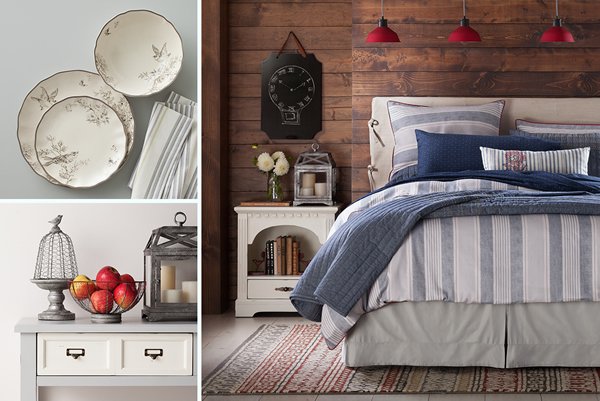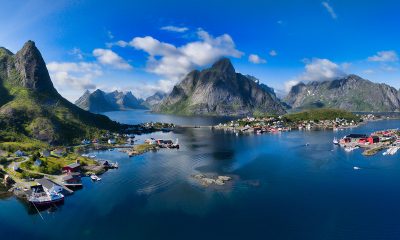a&e features
Beekman or bust
Gay entrepreneurs reinvent themselves at rural N.Y. farm
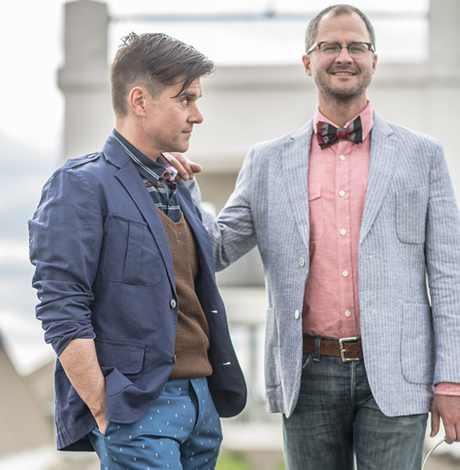
When Josh Kilmer-Purcell and Brent Ridge took time from their bustling New York City life to go apple picking, they had no idea they were embarking on a trip that would be the start of their own business, reality TV fame and change their lives.
In a set-up that sounds like something out of a sitcom, Kilmer-Purcell and Ridge ended up getting lost on their apple picking adventure and wound up in Sharon Springs, N.Y., a rural town teeming with quirk and charm. They found the American Hotel, owned by local gay couple Doug Plummer and Garth Roberts, and decided to spend the night. The next day on the way home, the pair stumbled across Beekman Farm, a local farm that happened to be for sale.
Kilmer-Purcell and Ridge fell in love with the property, cashed in everything they had, took out a mortgage and became the proud owners. They had no idea the farm would end up being their saving grace.
The recession of 2008 brought misfortune to many, including Kilmer-Purcell who lost his job in advertising and Ridge who lost his position as vice president of healthy living at Martha Stewart Omnimedia. Without big city earnings to keep them afloat, the couple knew they had to figure out a way to profit off their farm. The farm’s neighbor John Hale, affectionally nicknamed by the town Farmer John and also a gay man, was also down on his luck and lost his farm. He left a letter in Kilmer-Purcell and Ridge’s mailbox asking if he could store his goats at their farm. The couple couldn’t say no.
Farmer John and his 80 goats moved into Beekman Farm and the couple realized they had been given an opportunity to profit.
“We actually started Googling ‘What can we do with goat milk?’ and the first thing that came up was goat milk soap,” Kilmer-Purcell says. “It just so happened one of our neighbors was a soap maker and she taught us how to make the soap with goat milk. Then she introduced us to another neighbor who was a weaver and another neighbor who was a blacksmith. We realized there was all these great craftspeople that were making amazing products, but didn’t know how to market them. That’s when we fell back on our skills in advertising and with Martha Stewart.”
From there, the brand Beekman 1802 was born. The company expanded from goat milk and now sells everything from artisanal cheeses, skin care, clothing, kitchenware, bedding, rugs, cookbooks and much more.
Their brand’s tagline is “Cultivate a better life” and it’s something that goes beyond marketing for the two.
”We chose that because there are so many lifestyle brands out there from Kardashian, even Martha Stewart, that want you to think there are all these magic ways your life will become better if you just buy their products. We believe that having a better life is a lot of hard work. It’s a lot of helping your neighbors and those things don’t just happen. So we’re not just a brand of things you buy we have a philosophy of helping your neighbor,” Kilmer-Purcell says.
After launching a line of pasta sauces made from small farm ingredients, Target reached out to the entrepreneurial couple for a collaboration for a food line. Now Beekman 1802 Farmhouse, the brand’s home line, launched on Sept. 14 and is available for purchase on target.com. The collection is Americana rustic with a modern twist and includes items such as a dinnerware collection, bedding collection, lightening collection, rugs, a sofa and much more. Prices range from $14.99 to $599.99.
The significance of having their items sold by a big-name retailer like Target isn’t lost on the couple.
“A company like Target never would have launched a food or home brand with a company that is so visibly fronted by a long-term gay couple,” Ridge says. “I think it just shows how far we’ve come.Target is a middle-America-based retailer and the fact that it’s a non-issue for them really shows where we are truly at in America.”
Kilmer-Purcell and Ridge’s journey from city boys to farmers can be seen on their now-defunct, three-season reality television show “The Fabulous Beekman Boys,” which aired on Planet Green and the Cooking Channel.
Although the reality show experience was new for the town, Kilmer-Purcell and Ridge say people were very welcoming to the show and to the couple.
“We always say Doug and Garth at the American Hotel were the pioneers. They were the first gay couple to move into the area in the late ‘90s and they were so beloved that Doug is now the mayor now,” Kilmer-Purcell says. “People here were really open to the idea of outsiders because they had brought in business and tourism. So we walked into a really friendly atmosphere. We always say homophobia is a luxury of the middle class because rich people generally have more exposure to the world and poor people have bigger things to worry about.”
The town even became part of one of the biggest days in the couple’s lives.
“They always think what we’re doing is weird, but I think they’ve learned to trust us because we genuinely bring a lot of good energy and outside people into the area,” Ridge says. “When we got married in 2013, we invited everybody in Sharon Springs to the wedding. They all came including priests and pastors from congregations that didn’t recognize gay marriage.”
The couple — who’ve been together 16 years — says although it was weird having cameras around at first, they became used to the environment and formed a special relationship with the crew. Kilmer-Purcell and Ridge even attended the director’s wedding.
Their newfound reality TV fame also landed them on the 21st season of “The Amazing Race,” in which they came in first.
While they have earned acclaim for their creative business, the couple thinks there is more behind the stereotype that gay people have a great eye for design that runs deep.
“Our philosophy is that growing up LGBT kids have to be really creative,” Kilmer-Purcell says. “I don’t know if it’s true anymore but when we were growing up we had to be really creative to find ways to hide your true identity. You start your life being incredibly creative. It makes a lot of sense that LGBT people go into creative fields. Most of the heteronormative world, they can just go with the flow their entire lives. Whereas LGBT people have to start overcoming obstacles as soon as they are aware of their differences.”
The couple have utilized their creativity to new heights by expanding their business in ways beyond a food and home line into giving experiences to others.
Website visitors can take a live look at the Live Goat Cam, a live stream feed on beekman1802.com to experience the beauty of their goats for free from anywhere in the world.
The couple has also curated “Trips of a Lifetime” in which small groups of people ranging from 15 to 25 can purchase trips with the couple to international locations. The trips are designed with a commitment to agriculture, philanthropy and understanding different cultures in mind. Last year, they went to Cuba and next year they are planning a trip to India.
With all Kilmer-Purcell and Ridge have accomplished, there is still one aspect of their brand that they may never live down.
“When we moved in, because we owned the Beekman Farm, everyone started calling us the Beekman Boys. And everybody still calls us ‘the boys’ and I have this dreaded feeling that we’re going to be 80 years old and they’ll still be calling us ‘the boys,” Ridge says.
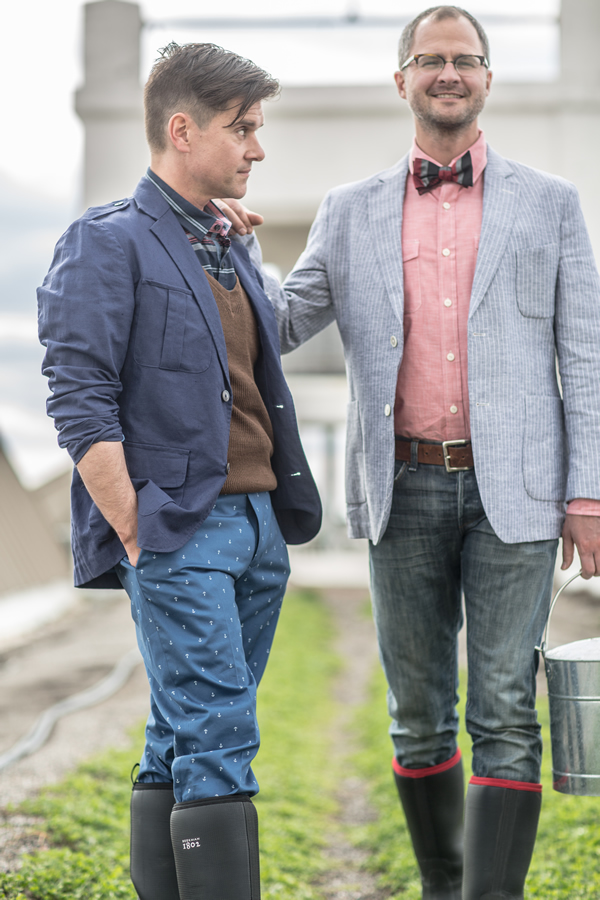
Brent Ridge, left, and husband Josh Kilmer-Purcell. (Photo courtesy the couple)
a&e features
Visit Cambridge, a ‘beautiful secret’ on Maryland’s Eastern Shore
New organization promotes town’s welcoming vibe, LGBTQ inclusion

CAMBRIDGE, Md. — Driving through this scenic, historic town on Maryland’s Eastern Shore, you’ll be charmed by streets lined with unique shops, restaurants, and beautifully restored Victorian homes. You’ll also be struck by the number of LGBTQ Pride flags flying throughout the town.
The flags are a reassuring signal that everyone is welcome here, despite the town’s location in ruby red Dorchester County, which voted for Donald Trump over Kamala Harris by a lopsided margin. But don’t let that deter you from visiting. A new organization, Proudly Cambridge, is holding its debut Pride event this weekend, touting the town’s welcoming, inclusive culture.
“We stumbled on a beautiful secret and we wanted to help get the word out,” said James Lumalcuri of the effort to create Proudly Cambridge.
The organization celebrates diversity, enhances public spaces, and seeks to uplift all that Cambridge has to share, according to its mission statement, under the tagline “You Belong Here.”
The group has so far held informal movie nights and a picnic and garden party; the launch party is June 28 at the Cambridge Yacht Club, which will feature a Pride celebration and tea dance. The event’s 75 tickets sold out quickly and proceeds benefit DoCo Pride.
“Tickets went faster than we imagined and we’re bummed we can’t welcome everyone who wanted to come,” Lumalcuri said, adding that organizers plan to make “Cheers on the Choptank” an annual event with added capacity next year.
One of the group’s first projects was to distribute free Pride flags to anyone who requested one and the result is a visually striking display of a large number of flags flying all over town. Up next: Proudly Cambridge plans to roll out a program offering affirming businesses rainbow crab stickers to show their inclusiveness and LGBTQ support. The group also wants to engage with potential visitors and homebuyers.
“We want to spread the word outside of Cambridge — in D.C. and Baltimore — who don’t know about Cambridge,” Lumalcuri said. “We want them to come and know we are a safe haven. You can exist here and feel comfortable and supported by neighbors in a way that we didn’t anticipate when we moved here.”

Lumalcuri, 53, a federal government employee, and his husband, Lou Cardenas, 62, a Realtor, purchased a Victorian house in Cambridge in 2021 and embarked on an extensive renovation. The couple also owns a home in Adams Morgan in D.C.
“We saw the opportunity here and wanted to share it with others,” Cardenas said. “There’s lots of housing inventory in the $300-400,000 range … we’re not here to gentrify people out of town because a lot of these homes are just empty and need to be fixed up and we’re happy to be a part of that.”
Lumalcuri was talking with friends one Sunday last year at the gazebo (affectionately known as the “gayzebo” by locals) at the Yacht Club and the idea for Proudly Cambridge was born. The founding board members are Lumalcuri, Corey van Vlymen, Brian Orjuela, Lauren Mross, and Caleb Holland. The group is currently working toward forming a 501(c)3.
“We need visibility and support for those who need it,” Mross said. “We started making lists of what we wanted to do and the five of us ran with it. We started meeting weekly and solidified what we wanted to do.”
Mross, 50, a brand strategist and web designer, moved to Cambridge from Atlanta with her wife three years ago. They knew they wanted to be near the water and farther north and began researching their options when they discovered Cambridge.
“I had not heard of Cambridge but the location seemed perfect,” she said. “I pointed on a map and said this is where we’re going to move.”
The couple packed up, bought a camper trailer and parked it in different campsites but kept coming back to Cambridge.
“I didn’t know how right it was until we moved here,” she said. “It’s the most welcoming place … there’s an energy vortex here – how did so many cool, progressive people end up in one place?”
Corey van Vlymen and his husband live in D.C. and were looking for a second home. They considered Lost River, W.Va., but decided they preferred to be on the water.
“We looked at a map on both sides of the bay and came to Cambridge on a Saturday and bought a house that day,” said van Vlymen, 39, a senior scientist at Booz Allen Hamilton. They’ve owned in Cambridge for two years.
They were drawn to Cambridge due to its location on the water, the affordable housing inventory, and its proximity to D.C.; it’s about an hour and 20 minutes away.
Now, through the work of Proudly Cambridge, they hope to highlight the town’s many attributes to residents and visitors alike.
“Something we all agree on is there’s a perception problem for Cambridge and a lack of awareness,” van Vlymen said. “If you tell someone you’re going to Cambridge, chances are they think, ‘England or Massachusetts?’”
He cited the affordability and the opportunity to save older, historic homes as a big draw for buyers.
“It’s all about celebrating all the things that make Cambridge great,” Mross added. “Our monthly social events are joyful and celebratory.” A recent game night drew about 70 people.
She noted that the goal is not to gentrify the town and push longtime residents out, but to uplift all the people who are already there while welcoming new visitors and future residents.
They also noted that Proudly Cambridge does not seek to supplant existing Pride-focused organizations. Dorchester County Pride organizes countywide Pride events and Delmarva Pride was held in nearby Easton two weeks ago.
“We celebrate all diversity but are gay powered and gay led,” Mross noted.
To learn more about Proudly Cambridge, visit the group on Facebook and Instagram.
What to see and do
Cambridge, located 13 miles up the Choptank River from the Chesapeake Bay, has a population of roughly 15,000. It was settled in 1684 and named for the English university town in 1686. It is home to the Harriet Tubman Museum, mural, and monument. Its proximity to the Blackwater National Wildlife Refuge makes it a popular stop for birders, drawn to more than 27,000 acres of marshland dubbed “the Everglades of the north.”
The refuge is walkable, bikeable, and driveable, making it an accessible attraction for all. There are kayaking and biking tours through Blackwater Adventures (blackwateradventuresmd.com).
Back in town, take a stroll along the water and through historic downtown and admire the architecture. Take in the striking Harriet Tubman mural (424 Race St.). Shop in the many local boutiques, and don’t miss the gay-owned Shorelife Home and Gifts (421 Race St.), filled with stylish coastal décor items.
Stop for breakfast or lunch at Black Water Bakery (429 Race St.), which offers a full compliment of coffee drinks along with a build-your-own mimosa bar and a full menu of creative cocktails.
The Cambridge Yacht Club (1 Mill St.) is always bustling but you need to be a member to get in. Snapper’s on the water is temporarily closed for renovations. RaR Brewing (rarbrewing.com) is popular for craft beers served in an 80-year-old former pool hall and bowling alley. The menu offers burgers, wings, and other bar fare.
For dinner or wine, don’t miss the fantastic Vintage 414 (414 Race St.), which offers lunch, dinner, wine tasting events, specialty foods, and a large selection of wines. The homemade cheddar crackers, inventive flatbreads, and creative desserts (citrus olive oil cake, carrot cake trifle) were a hit on a recent visit.
Also nearby is Ava’s (305 High St.), a regional chain offering outstanding Italian dishes, pizzas, and more.
For something off the beaten path, visit Emily’s Produce (22143 Church Creek Rd.) for its nursery, produce, and prepared meals.
“Ten minutes into the sticks there’s a place called Emily’s Produce, where you can pay $5 and walk through a field and pick sunflowers, blueberries, you can feed the goats … and they have great food,” van Vlymen said.
As for accommodations, there’s the Hyatt Regency Chesapeake Bay (100 Heron Blvd. at Route 50), a resort complex with golf course, spa, and marina. Otherwise, check out Airbnb and VRBO for short-term rentals closer to downtown.
Its proximity to D.C. and Baltimore makes Cambridge an ideal weekend getaway. The large LGBTQ population is welcoming and they are happy to talk up their town and show you around.
“There’s a closeness among the neighbors that I wasn’t feeling in D.C.,” Lumalcuri said. “We look after each other.”
a&e features
James Baldwin bio shows how much of his life is revealed in his work
‘A Love Story’ is first major book on acclaimed author’s life in 30 years

‘Baldwin: A Love Story’
By Nicholas Boggs
c.2025, FSG
$35/704 pages
“Baldwin: A Love Story” is a sympathetic biography, the first major one in 30 years, of acclaimed Black gay writer James Baldwin. Drawing on Baldwin’s fiction, essays, and letters, Nicolas Boggs, a white writer who rediscovered and co-edited a new edition of a long-lost Baldwin book, explores Baldwin’s life and work through focusing on his lovers, mentors, and inspirations.
The book begins with a quick look at Baldwin’s childhood in Harlem, and his difficult relationship with his religious, angry stepfather. Baldwin’s experience with Orilla Miller, a white teacher who encouraged the boy’s writing and took him to plays and movies, even against his father’s wishes, helped shape his life and tempered his feelings toward white people. When Baldwin later joined a church and became a child preacher, though, he felt conflicted between academic success and religious demands, even denouncing Miller at one point. In a fascinating late essay, Baldwin also described his teenage sexual relationship with a mobster, who showed him off in public.
Baldwin’s romantic life was complicated, as he preferred men who were not outwardly gay. Indeed, many would marry women and have children while also involved with Baldwin. Still, they would often remain friends and enabled Baldwin’s work. Lucien Happersberger, who met Baldwin while both were living in Paris, sent him to a Swiss village, where he wrote his first novel, “Go Tell It on the Mountain,” as well as an essay, “Stranger in the Village,” about the oddness of being the first Black person many villagers had ever seen. Baldwin met Turkish actor Engin Cezzar in New York at the Actors’ Studio; Baldwin later spent time in Istanbul with Cezzar and his wife, finishing “Another Country” and directing a controversial play about Turkish prisoners that depicted sexuality and gender.
Baldwin collaborated with French artist Yoran Cazac on a children’s book, which later vanished. Boggs writes of his excitement about coming across this book while a student at Yale and how he later interviewed Cazac and his wife while also republishing the book. Baldwin also had many tumultuous sexual relationships with young men whom he tried to mentor and shape, most of which led to drama and despair.
The book carefully examines Baldwin’s development as a writer. “Go Tell It on the Mountain” draws heavily on his early life, giving subtle signs of the main character John’s sexuality, while “Giovanni’s Room” bravely and openly shows a homosexual relationship, highly controversial at the time. “If Beale Street Could Talk” features a woman as its main character and narrator, the first time Baldwin wrote fully through a woman’s perspective. His essays feel deeply personal, even if they do not reveal everything; Lucian is the unnamed visiting friend in one who the police briefly detained along with Baldwin. He found New York too distracting to write, spending his time there with friends and family or on business. He was close friends with modernist painter Beauford Delaney, also gay, who helped Baldwin see that a Black man could thrive as an artist. Delaney would later move to France, staying near Baldwin’s home.
An epilogue has Boggs writing about encountering Baldwin’s work as one of the few white students in a majority-Black school. It helpfully reminds us that Baldwin connects to all who feel different, no matter their race, sexuality, gender, or class. A well-written, easy-flowing biography, with many excerpts from Baldwin’s writing, it shows how much of his life is revealed in his work. Let’s hope it encourages reading the work, either again or for the first time.
a&e features
Looking back at 50 years of Pride in D.C
Washington Blade’s unique archives chronicle highs, lows of our movement
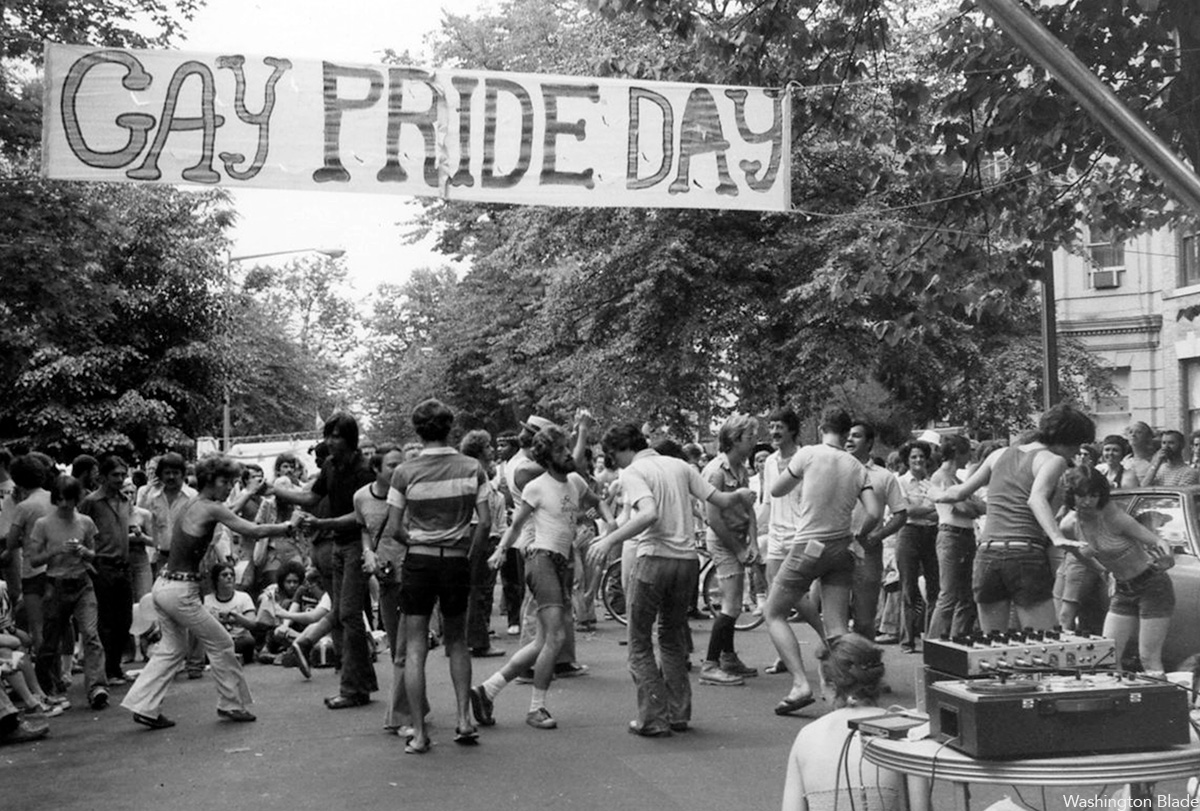
To celebrate the 50th anniversary of LGBTQ Pride in Washington, D.C., the Washington Blade team combed our archives and put together a glossy magazine showcasing five decades of celebrations in the city. Below is a sampling of images from the magazine but be sure to find a print copy starting this week.
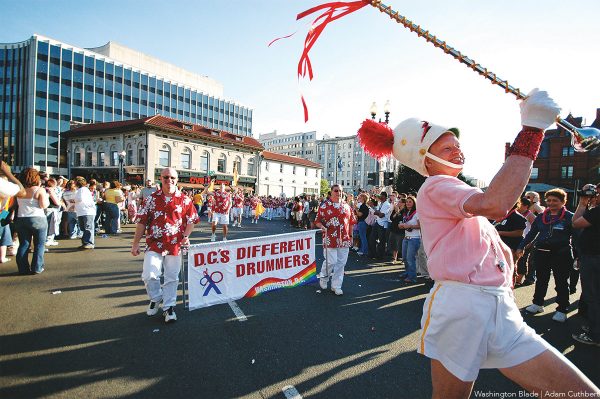
The magazine is being distributed now and is complimentary. You can find copies at LGBTQ bars and restaurants across the city. Or visit the Blade booth at the Pride festival on June 7 and 8 where we will distribute copies.
Thank you to our advertisers and sponsors, whose support has enabled us to distribute the magazine free of charge. And thanks to our dedicated team at the Blade, especially Photo Editor Michael Key, who spent many hours searching the archives for the best images, many of which are unique to the Blade and cannot be found elsewhere. And thanks to our dynamic production team of Meaghan Juba, who designed the magazine, and Phil Rockstroh who managed the process. Stephen Rutgers and Brian Pitts handled sales and marketing and staff writers Lou Chibbaro Jr., Christopher Kane, Michael K. Lavers, Joe Reberkenny along with freelancer and former Blade staffer Joey DiGuglielmo wrote the essays.
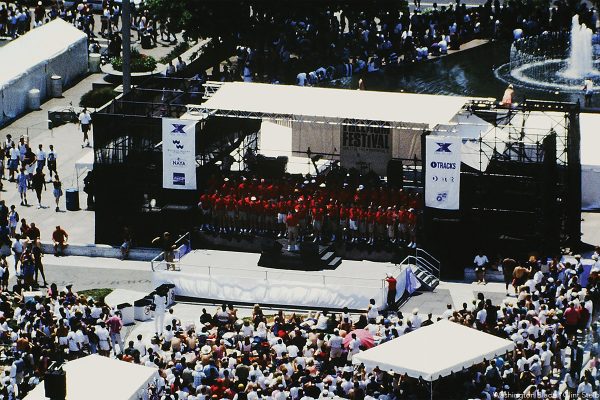
The magazine represents more than 50 years of hard work by countless reporters, editors, advertising sales reps, photographers, and other media professionals who have brought you the Washington Blade since 1969.
We hope you enjoy the magazine and keep it as a reminder of all the many ups and downs our local LGBTQ community has experienced over the past 50 years.
I hope you will consider supporting our vital mission by becoming a Blade member today. At a time when reliable, accurate LGBTQ news is more essential than ever, your contribution helps make it possible. With a monthly gift starting at just $7, you’ll ensure that the Blade remains a trusted, free resource for the community — now and for years to come. Click here to help fund LGBTQ journalism.
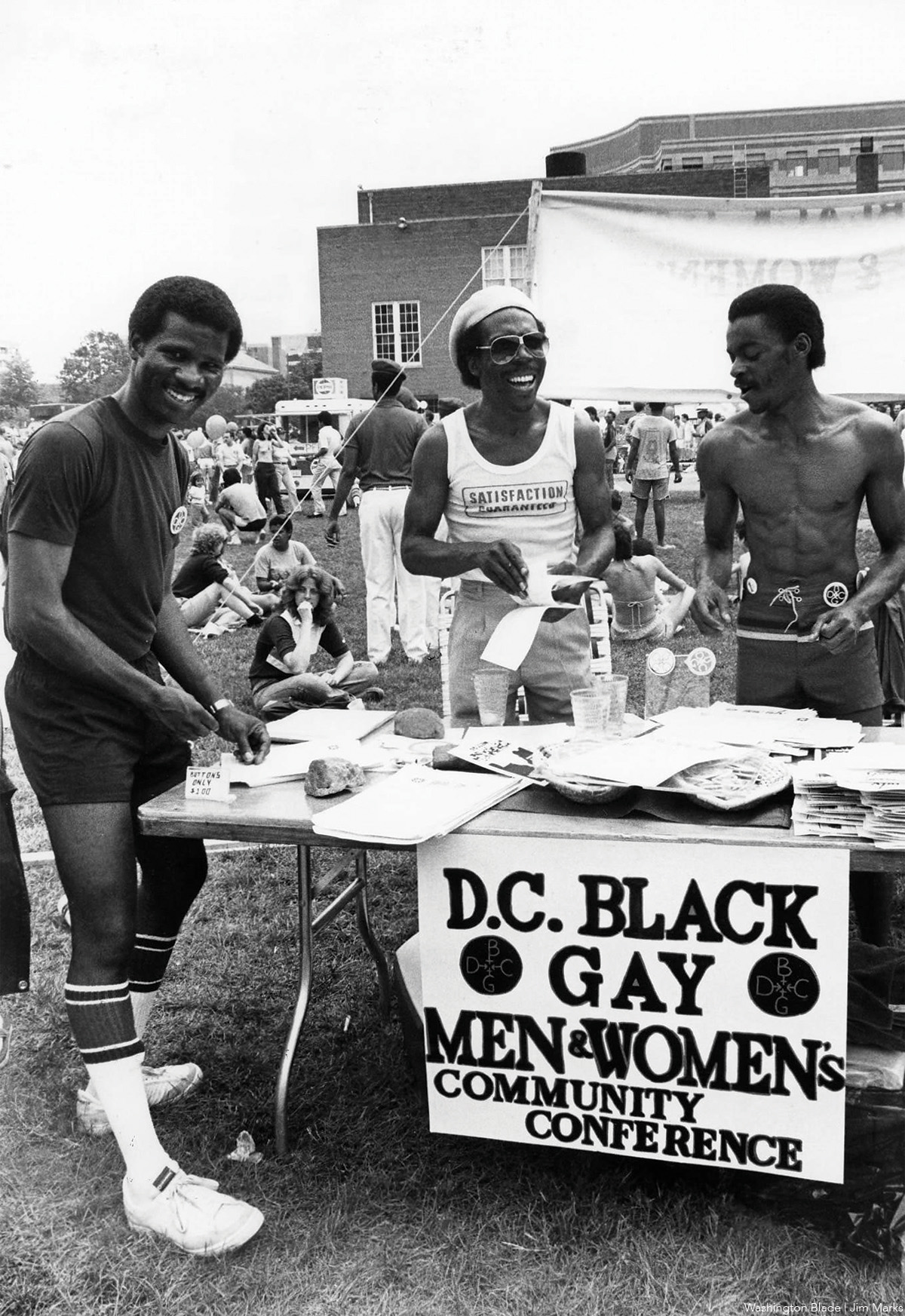
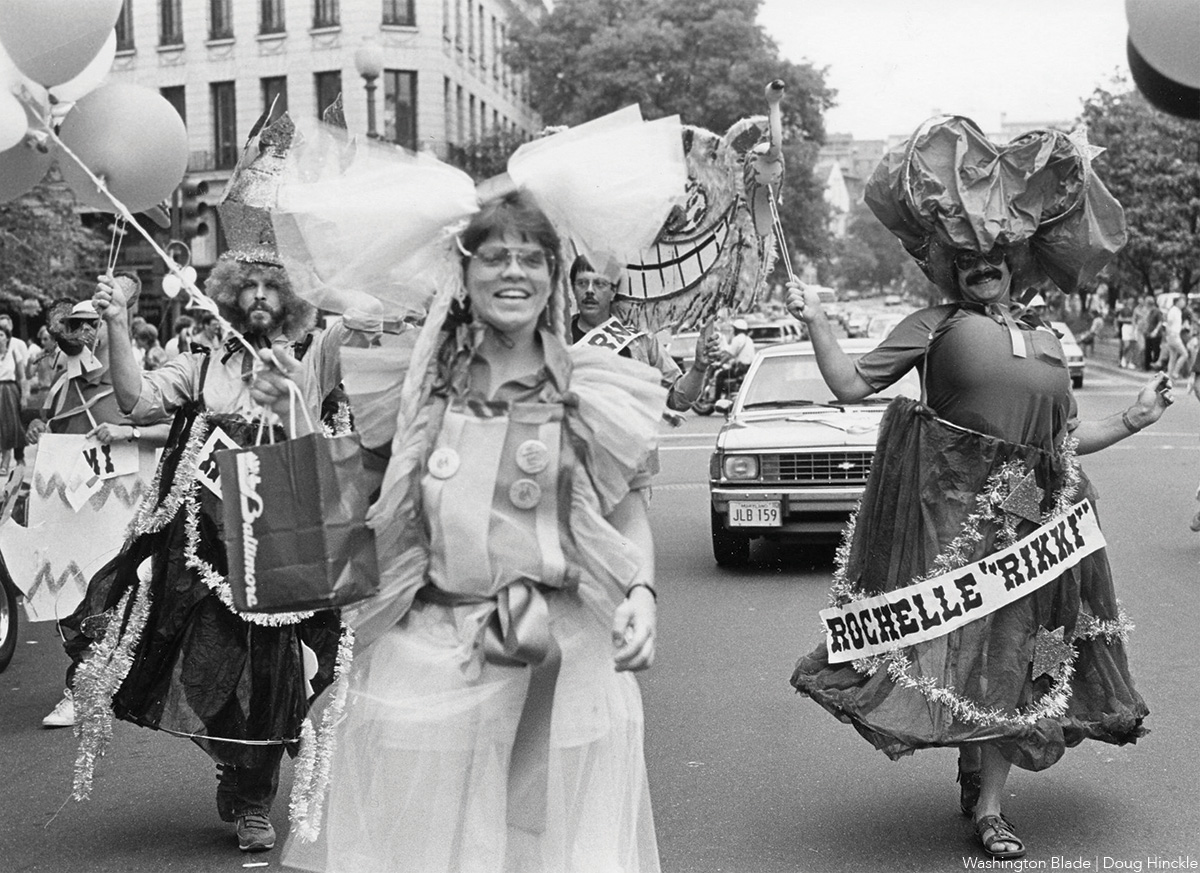
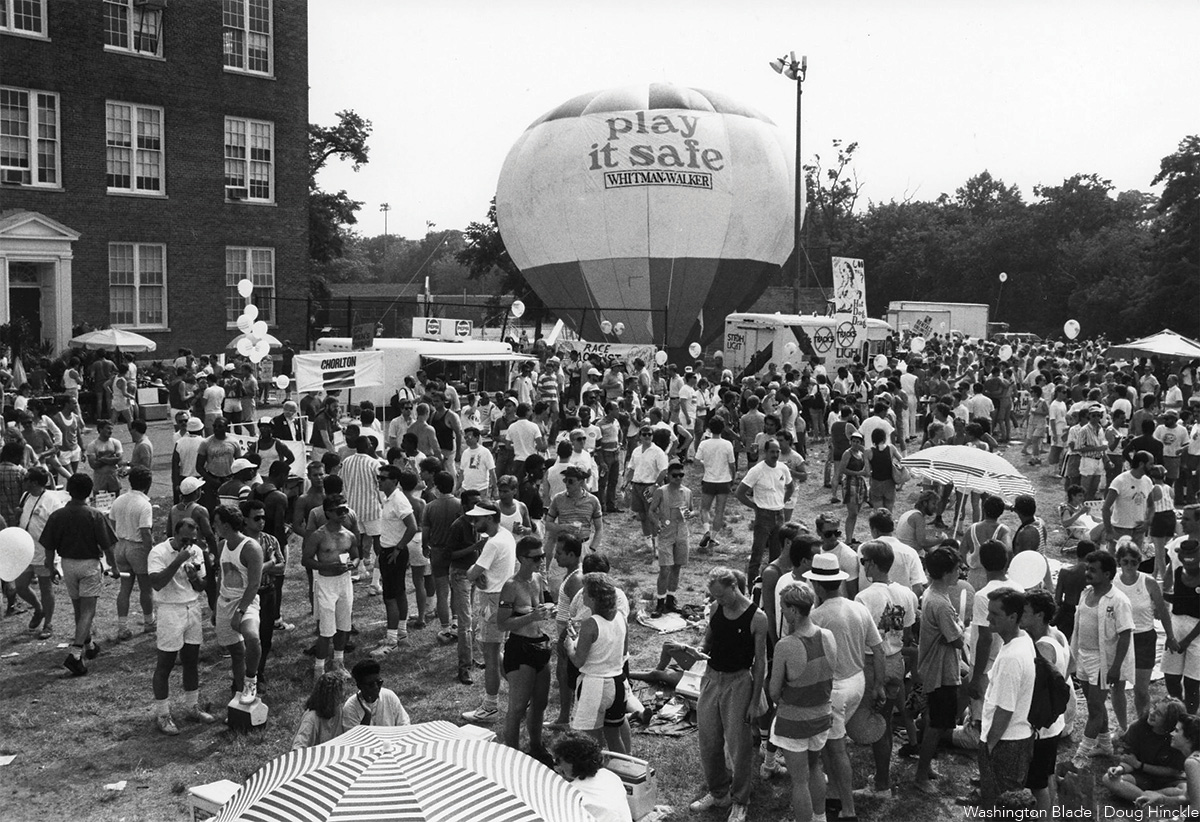
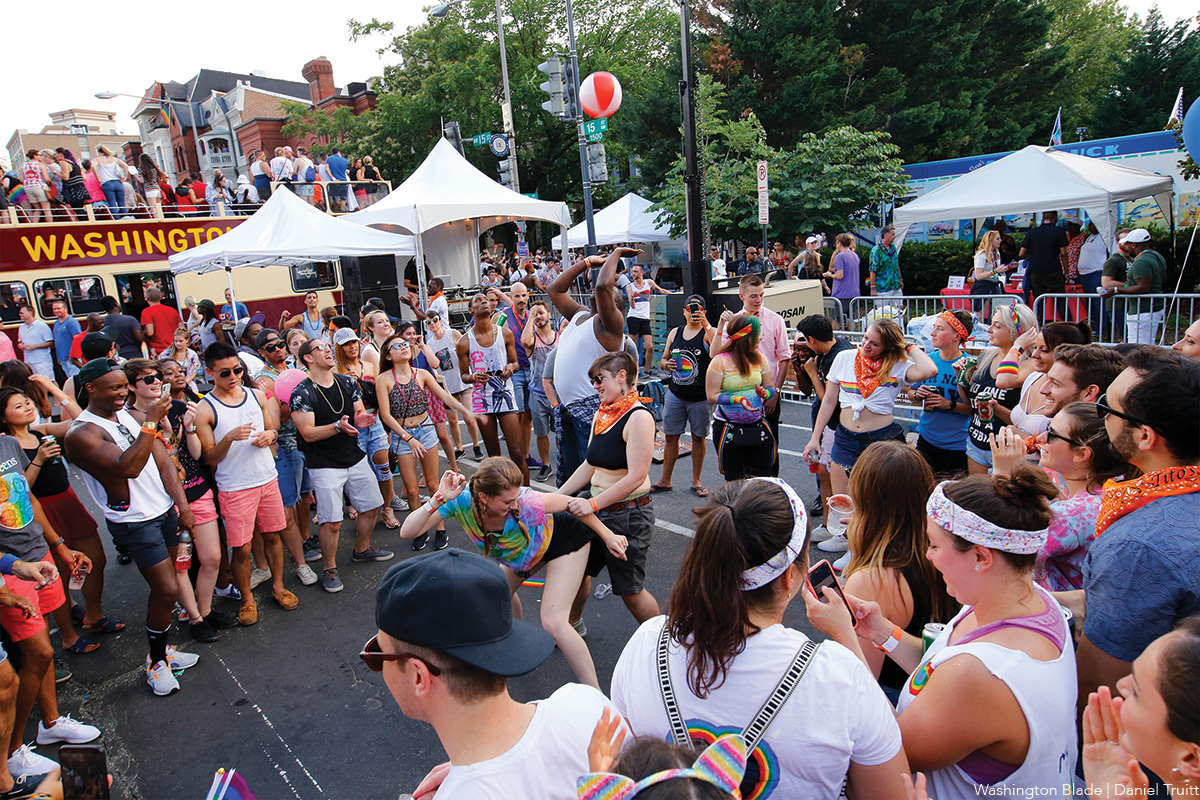
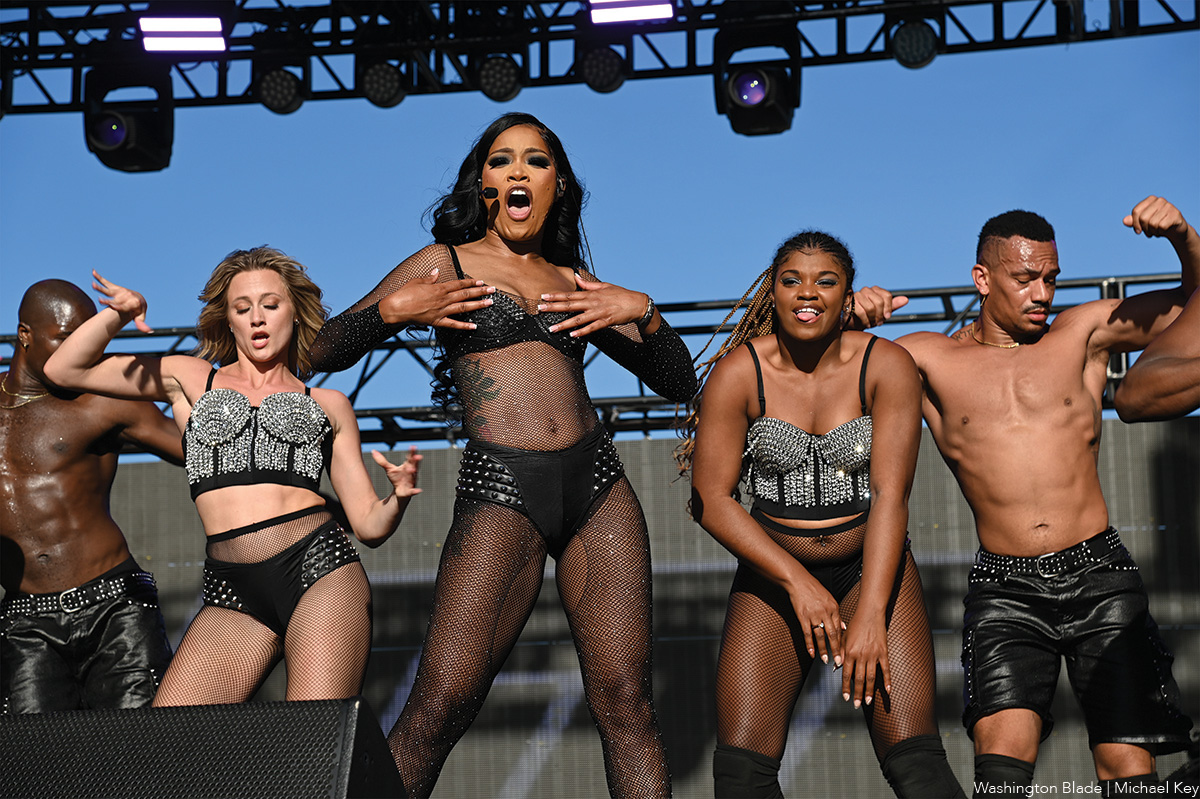
-

 U.S. Supreme Court3 days ago
U.S. Supreme Court3 days agoSupreme Court upholds ACA rule that makes PrEP, other preventative care free
-

 U.S. Supreme Court3 days ago
U.S. Supreme Court3 days agoSupreme Court rules parents must have option to opt children out of LGBTQ-specific lessons
-

 National5 days ago
National5 days agoEvan Wolfson on the 10-year legacy of marriage equality
-

 Congress4 days ago
Congress4 days agoSenate parliamentarian orders removal of gender-affirming care ban from GOP reconciliation bill

